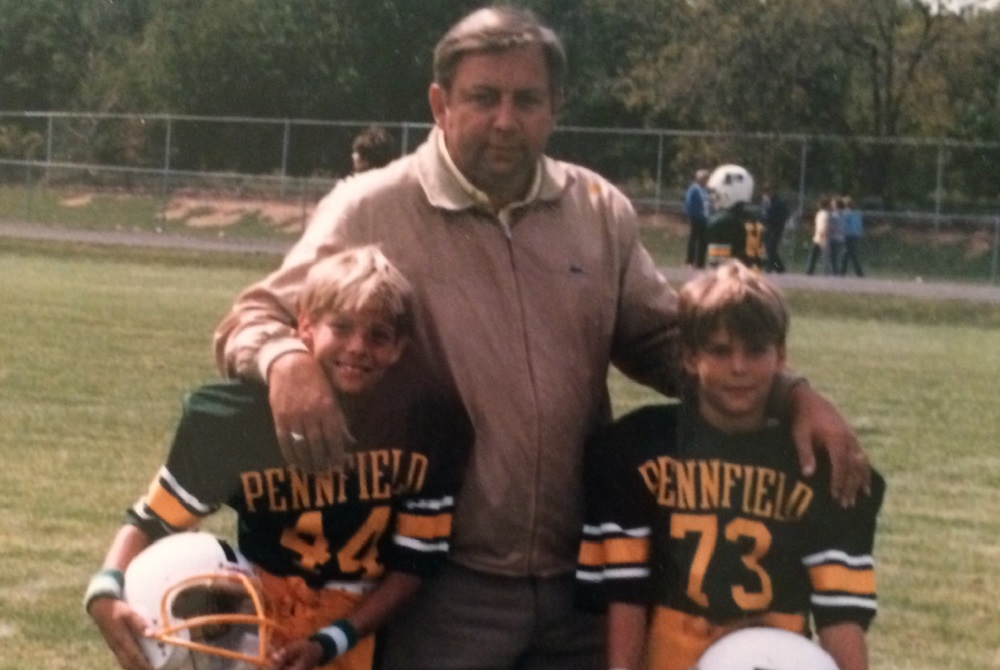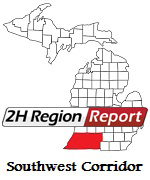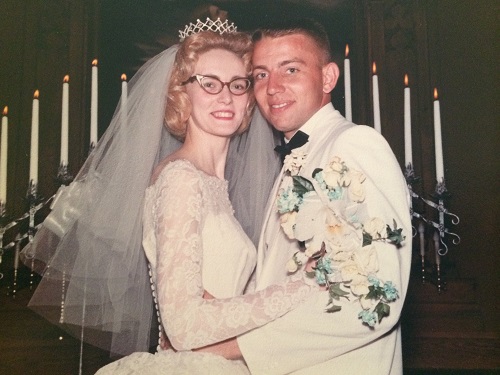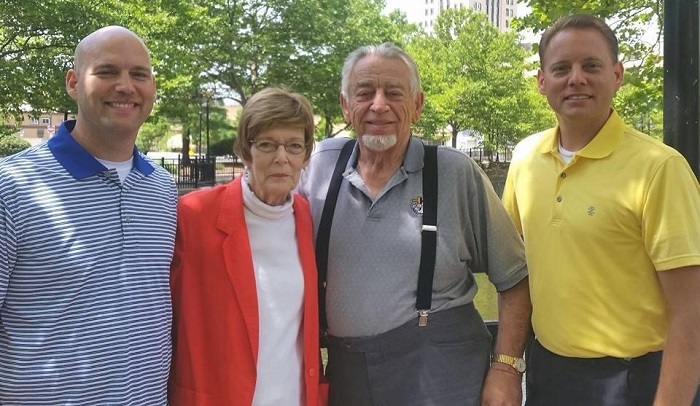
Concussion Testing Pilots Kick Off Fall
August 4, 2015
By Geoff Kimmerly
Second Half editor
The Michigan High School Athletic Association kicked off the 2015-16 school year Monday by hosting 70 member high schools for training in two pilot sideline concussion testing programs aimed at assisting in decision-making regarding the removal of athletes from activity after possible concussion events and record-keeping of those events beginning this fall.
Illinois-based King-Devick Test and Maryland-based XLNTbrain Sport each will be used to monitor approximately 10,000 Michigan high school student-athletes drawn from schools representing all four classes and a variety of regions statewide.
The pilot programs are part of a three-pronged advance by the MHSAA in concussion care this fall. In addition to becoming the first state association to offer pilot sideline concussion testing, the MHSAA will be the first to mandate record-keeping by member schools of all possible concussion events from detection to an athlete’s return to play. The requirement applies to both practices and events, all levels of all sports in grades 7 through 12.
The MHSAA also this fall is the first state association to provide all participants at every MHSAA member high school and junior high/middle school with insurance intended to pay accident medical expense benefits – covering deductibles and co-pays left unpaid by other policies – resulting from concussions sustained during MHSAA practices or competitions. There is no cost to either schools or families.
“These pilot programs are intended to not only improve what’s actually happening on the sidelines at practices and contests in these communities that are part of the pilot programs, they’re intended to spread the word of the need for improved concussion detection across every community,” MHSAA Executive Director John E. “Jack” Roberts said. “We hope these schools involved will become involved in their leagues and conferences and with their peers across the state as we expand the awareness of the need for better sideline detection and provide ways to get it done.”
The MHSAA asked schools at the end of this spring to volunteer for the pilot programs and then selected participants in order to guarantee a variety of schools based on enrollment and location. Schools are committed to involving at least two sports for each gender each season.
Schools participating in the XLNTbrain Sport pilot program are: Adrian, Adrian Madison, AuGres-Sims, Bay City Central, Bear Lake, Brethren, Belding, Birmingham Groves, Brighton, Chesaning, Corunna, Detroit Collegiate Prep, East Kentwood, Fennville, Fowlerville, Gibraltar Carlson, Grand Rapids Christian, Grandville, Greenville, Grosse Ile, Hamilton, Harrison Township L’Anse Creuse, Hazel Park, Kalamazoo Christian, Lansing Christian, Macomb L’Anse Creuse North, Owosso, Pewamo-Westphalia, Portland, Reese, Rochester Hills Lutheran Northwest, St. Clair Shores Lakeview, St. Johns, Stanton Central Montcalm, Vermontville Maple Valley, West Bloomfield and Wyoming Kelloggsville.
Schools participating in the King-Devick Test pilot are: Bay City Western, Benton Harbor, Buchanan, Calumet, Caro, Caseville, Detroit Cody, Detroit Martin Luther King, Fenton, Flint Kearsley, Frankenmuth, Fruitport, Garden City, Grand Ledge, Grand Rapids Northview, Lake Leelanau St. Mary, Lake Linden-Hubbell, Lincoln Alcona, Midland Bullock Creek, Montague, Muskegon, Niles, Pontiac Notre Dame Prep, Romeo, Saginaw Heritage, Scottville Mason County Central, Shelby, St. Charles, St. Joseph, Tawas, Vicksburg, Whitehall and Yale.
The King-Devick Test is a rapid eye movement screening evaluation that requires athletes to read single-digit numbers displayed on a tablet computer in order to detect impairments of eye movement, attention, language, concentration and other symptoms of abnormal brain function. The test has been validated in more than 50 recent peer reviewed articles published in elite medical journals and is associated with the Mayo Clinic.
The test is administered on the sidelines during evaluations for suspected head injuries, and the post-injury results are then compared to an athlete’s preseason baseline. Any worsening of performance (increased time and/or errors) suggests a concussion has occurred and the athlete should be “removed from play” for further evaluation.
“The first and most critical step in managing concussion in the youth athlete is to recognize when one has occurred – not always a simple task,” said Dr. David Dodick, professor of neurology and director of sports concussion services at the Mayo Clinic. “The King-Devick test helps take the guesswork and subjectivity out of the sideline evaluation in a rapid, accurate, and objective way.”
 XLNTbrain Sport includes balance and web-based neuro-cognitive tests also used before the start of a season to create a baseline measurement of reaction time, attention, inhibition, impulsivity, memory, information processing efficiency and executive function. The test also assesses mood, anxiety, stress and emotionality.
XLNTbrain Sport includes balance and web-based neuro-cognitive tests also used before the start of a season to create a baseline measurement of reaction time, attention, inhibition, impulsivity, memory, information processing efficiency and executive function. The test also assesses mood, anxiety, stress and emotionality.
After a possible head injury, a sideline assessment is done using a smartphone or tablet with those results then compared with the athlete’s baseline measurements. The program documents the severity of a concussion, provides a guide for on-the-field decision making regarding treatment and recovery time and can report results via email to parents, coaches, training staff and medical professionals.
Dr. Harry Kerasidis, who designed the XLNTbrain Sport software, presented at the Coalition for Concussion Treatment Summit at the United Nations building in 2014.
“We included an objective balance test that relies on smartphone accelerometer technology which is effective in the field during practice and game situations,” Kerasidis said. “Should a concussion injury be suspected, the system automatically generates a notification to parents and medical professionals and creates a recovery protocol and post-injury tracking so the right people can monitor the athlete’s progress. Then, the system assists medical professionals with the all-important return-to-learn and return-to-play clearance.”
Click for information on XLNTbrain Sport. Click for information on the King-Devick Test.
For more on Health & Safety, including preseason physical examination, hydration and cardiovascular resources in addition to concussion information and online training sessions, visit the MHSAA’s redesigned Health & Safety web page.
PHOTOS: (Top) Saginaw Heritage athletic director Peter Ryan (right) is administered the King-Devick baseline test by K-D's Samantha Figueroa. (Middle) XLNTbrain Sport creater Dr. Harry Kerasidis provides insight on his program to those being trained to use it Monday.

'Larger-Than-Life' Pennfield AD Admired for Statewide Service
By
Pam Shebest
Special for MHSAA.com
April 14, 2021
BATTLE CREEK — To many Battle Creek sports enthusiasts, Bernie Larson was known as “Mr. Pennfield.”
 But for two former athletes, twins Chris and Cam Larson, that was not the case.
But for two former athletes, twins Chris and Cam Larson, that was not the case.
“I never knew him or thought of him as Mr. Pennfield; he was Dad,” Chris said.
Larson, 78, who served as athletic director at Pennfield for 29 years, died March 14 after an extended illness.
A memorial service is being planned for May 15 at a time and place to be determined.
“A lot more remembrances come back when someone passes,” said Chris Larson, who lives in Virginia. “You hear so many stories from people who remember him, including former students and coaches.
“It’s great to hear the impact he had on so many people that you never knew about.”
Stories are plentiful when it comes to Bernie Larson.
“He was a heckuva golfer,” said Karen Leinaar, the current executive director of the Michigan Interscholastic Athletic Administrators Association (MIAAA) who during an early stop served as athletic director at Delton Kellogg, which with Pennfield for a time was part of the Kalamazoo Valley Association. “If you needed golf balls on the course, everyone said, ‘Just ask Bernie.’ He always had them.”
The reason?
“If he had one ball in his bag, he had 50 or 60 in his bag,” said Larry Wegener, former Battle Creek Central athletic director. “He had milk crates full of golf balls in his garage” that he found on the course or fished out of ponds.
Championship City
When Larson was named Pennfield’s athletic director in 1970, it became a family affair.
“I had no clue, no clue,” said Joni, Larson’s wife of 56 years. “We never trained to be wives of athletic directors. We learned the most from other wives.”
 She became involved in the job, selling tickets at home games. When their sons were old enough, they helped out with the field.
She became involved in the job, selling tickets at home games. When their sons were old enough, they helped out with the field.
“They knew where the flag was kept and how to play the national anthem. They learned how to keep score” and were active in playing sports, she recalled.
“Cam (who lives in Minnesota) played football, baseball and basketball,” Chris Larson said. “I played tennis, golf and basketball. We grew up playing little league baseball and football.”
One family favorite was the yearly athletic directors conference at Grand Traverse Resort.
“He was there for business; we kids were there for fun,” his son said. “As we got older, we went to the auditorium that was filled with booths with sports-related things.
“As a kid we went around and grabbed the swag. It was a kids of athletic directors thing.”
It was not all fun and games.
“Bernie Larson was instrumental putting Battle Creek on the map athletically,” Leinaar said. “Four of (the ADs), Bernie, Ralph Kenyon of Harper Creek, Glen Schulz of Lakeview and Larry Wegener of Central put on the tournaments and had crews of people every year right there helping.
“Their hard work and commitment to the MHSAA, running perfect tournaments, made Battle Creek a stop for athletics for many, many years. Many times, Bernie led the pack.”
In spite of his willingness to help others, there was a caveat, Leinaar said.
“He would say to me, ‘Karen, I’ll help you out however I can, but remember, Pennfield is going to win.’
“Pennfield joined the KVA in the late 1980s, so we saw each other quite a bit. Our football games were always barn burners as were track and field.”
 Wegener recalls those days full of tournaments and 65-hour work weeks.
Wegener recalls those days full of tournaments and 65-hour work weeks.
“We did so many MHSAA events, I think a lot of people thought we were on the staff,” he said.
Those tournaments included more than 50 state championships in baseball and softball, team and individual wrestling, volleyball and girls basketball.
Brett Steele, Pennfield’s current AD, said Larson “was still a strong presence in the athletic department and community as a whole even after he retired.
“Up until last winter, Bernie still helped out at football and basketball games as our officials host. He knew most of the officials in those sports and was a familiar face to many when they worked games at Pennfield.”
Larson had served as an MHSAA basketball and baseball official. He also helped found and is a member of the Pennfield Hall of Fame and coached both girls and boys golf.
He received the MHSAA’s Allen W. Bush Award in 1997, the MHSAA’s Charles Forsythe Award in 1999 and was the MIAAA State Athletic Director of the Year for 1991-92.
All About Family
In spite of the hours spent with his job, Larson was a good family man, Wegener said.
“He spoke highly of his kids,” he said. “Chris and Cam were the pride of his life. Joni was a real good fit for him.”
Wegener said Larson was a larger-than-life guy.
“If you were going to run a tournament and you brought a notebook full of stuff for your tournament, Bernie brought a briefcase.
“If you brought a briefcase, Bernie brought a suitcase. He just believed in being prepared for everything.”
One thing the athletic directors did a lot was frequent restaurants, and Larson had his favorites.
“Perkins whenever he traveled, the Pancake House every Sunday and the Irish Pub,” Chris Larson said.
A person could always spot Larson. He was with one with the napkin tucked over his shirt.
“He always wore a suit and tie and would use a napkin as a bib because he was always spilling something on his necktie,” Joni Larson said.
Another thing her husband was famous for was his jokes.
“He always had a favorite joke that I’d hear 27 times,” she said, laughing. “It was like he had a joke of the week, and everybody had to hear it.”
During summers, Larson taught driver’s education at the school, something Chris Larson remembers well.
 “I remember on the last day of driver’s ed, you drove for 45 minutes,” he said. “My brother and I and one other kid were in the car, and I drove to Lansing to the MHSAA and we sat in the parking lot while my dad went inside.
“I remember on the last day of driver’s ed, you drove for 45 minutes,” he said. “My brother and I and one other kid were in the car, and I drove to Lansing to the MHSAA and we sat in the parking lot while my dad went inside.
“I know the MHSAA through his eyes and through my own eyes.”
Larson’s love of sports transferred to his sons.
“We all share a love of golf and would play together any chance we got, but over the past years his health wouldn't allow him to play,” Chris Larson said. “I miss that very much.”
Another tradition is being carried on by his son, but it evolved in an unusual way.
The twins were a Christmas surprise for Bernie and Joni.
“They didn’t do ultrasounds routinely back then (1974) so we didn’t know,” Joni Larson said. “We had Bernie’s middle name, Leon, picked out as a first name,” Joni Larson said.
“When we found out there were twins, we gave Chris ‘Leon’ as his middle name and Cameron ‘Noel’ which is Leon backwards, so both had dad’s middle name.”
Chris Larson has continued the tradition, giving his oldest son, Joshua, Leon as a middle name.
Chris Larson echoed the thoughts of many who knew Mr. Pennfield as a people person.
“In my opinion, he was the most Christian man I knew. He lived a Christian life and he shared it with others,” Chris said.
“He was chaplain for some baseball and basketball teams. He knew somebody everywhere no matter where we went in the state.”
Chris Larson paid a special tribute to his father after the funeral.
“He had a parking spot in the circle of the old Pennfield High School right in front of his office,” he said. “His van was there all the time.
“One of the things I did after the funeral was just hang out there for a while.”
 Pam Shebest served as a sportswriter at the Kalamazoo Gazette from 1985-2009 after 11 years part-time with the Gazette while teaching French and English at White Pigeon High School. She can be reached at [email protected] with story ideas for Calhoun, Kalamazoo and Van Buren counties.
Pam Shebest served as a sportswriter at the Kalamazoo Gazette from 1985-2009 after 11 years part-time with the Gazette while teaching French and English at White Pigeon High School. She can be reached at [email protected] with story ideas for Calhoun, Kalamazoo and Van Buren counties.
PHOTOS: (Top) Longtime Pennfield athletic director Bernie Larson also raised his family in the district, with sons Chris (left) and Cam among those to wear the uniform. (2) Bernie and Joni Larson were married 56 years. (3) Among Larson’s longtime colleagues were former Delton Kellogg athletic director Karen Leinaar and retired Battle Creek Central athletic director Larry Wegener. (4) The Larson family, more recently, from left: Cam, Joni, Bernie and Chris. (Family photos courtesy of the Larson family; head shots by Pam Shebest.)

